Jerald Arthur Wright was an innovator, a dreamer, a mayor of the block who was always careful in listening to the needs of others. He was also a caring son.
At the time of his death, he was a 31-year-old Disney employee working merchandising in both Magic Kingdom and Tomorrowland. He received a promotion two days before he was murdered by a 29-year-old man who opened fire with an assault rifle, killing 48 and injuring 53 victims on June 12, 2016 at Pulse nightclub in Orlando in the deadliest shooting in modern American history.
Five years later, some family members and loved ones still feel the pain of his passing.
One of these is Jerry’s mother, Maria Wright, who says a part of her died that long-ago day.
“Once I turned on the TV that morning and saw live aerial coverage of the nightclub, I noticed Jerry’s car outside of the [nightclub] and that’s when I knew,” said Mrs.Wright.
After the loss of their son, Maria and her husband Jerald Wright dedicated their time to moving common-sense gun laws to the forefront of political discussion in Congress. They have tried to raise awareness about the epidemic of gun violence by speaking to audiences including Pride Orlando, LGBTQ groups in Maine, and Moms Demand Action, a gun reform organization among various others.
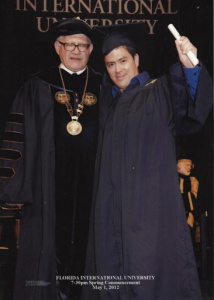
Maria recalls that Jerry, who was a Florida International University graduate, didn’t call her the night of the shooting, which was unusual because Jerry checked in frequently.
“He would call us twice a day just to see what we were up to,” she said.
Fred Wright remembers the times his son would call him “I would always answer ‘Yankee Stadium, center field, may I help you?” he recalls. Jerry would say, “What’s the score?”
“We definitely miss his voice,” said Mr.Wright.
On Sunday morning, Jerry’s parents arrived in Orlando around 11:30 am calling the hospital hotlines praying that her son would not be among the victims.
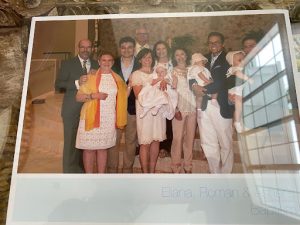
“It was one of the most heartbreaking moments of my life. I remember saying on the drive up ‘Whatever happens I will not let hate enter my heart.’” said Mrs.Wright. “I packed a sweater, thinking in my mind that he would need it since hospitals are usually cold.”
The ride up to Orlando to visit their son at the happiest place on Earth, became a desperate search for their son’s survival.
When they arrived, they headed for a family reunification center in a hotel lobby near the nightclub, where people were gathered as she described them as being “lifeless and just walking zombies.”
Several restaurants provided food donations for the victims’ families, and prayer groups had been set up. “No one knew anything. I just remember people walking up asking if I knew for sure he was there, if I had a picture,” said Mrs.Wright.
She stayed in the lobby while her husband visited several hospitals.
Later that evening Jerry’s parents waited as a doctor stood on a table and started going over the names of the people in hospitals, in alphabetical order.
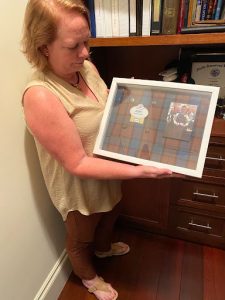
“While they read the names of the victims at the hospital, his name didn’t come up,” said Mrs. Wright.
Jerry’s whereabouts were still unknown.
“We were told we’d have to wait—not to call, not to head over to the medical examiner—just to wait,” said Mrs.Wright. “During that time I just remember sitting there thinking his last name starts with W so he’ll be one of the last ones, and ironically praying that my child might be so badly injured he couldn’t reach out to me. That was what I was praying for, ’cause the alternative was worse.”
On Monday around noon, authorities escorted Jerry’s parents to identify the body of their 31-year old son.
“At this point, I’m looking over my dead child and I realized that there was Styrofoam over where his chest should be,” said Mrs.Wright. “I am just screaming, feeling as if my insides were gone.”
In that moment, she was reminded of an act only the two of them knew, “Jerry would lightly pinch my shoulder as a kind gesture,” she said. I miss those moments,” she said.
When she saw her son’s corpse “I felt like there was a whisper and I knew I wasn’t alone and that Jerry was okay, giving me some form of peace,” she said.
Over 800 people attended her son’s funeral.
Xavi Navarro is one of 25 cousins in the Wright family. He and Jerry grew up in Miami together and were the same age, so they were close.
They split up during their formative years in college. Navarro described Jerry’s drive to pursue hospitality in Disney World as being “the perfect fit for him.”
“Jerry would be the type of person to out-gentleman me,” said said “He was an overall caring person. At his core, Jerry enjoyed helping and serving others.”
Gun violence in the United States: A nationwide issue
A month after losing their child, Mr. and Mrs.Wright made their way to Capitol Hill to demand lawmakers to enact stronger gun control laws and prevent another massacre such as Pulse.
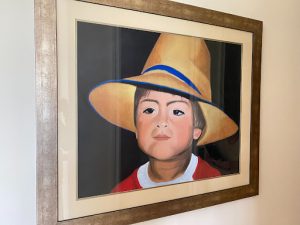
They focused their efforts on bringing the conversation of gun issues to the political dialogue with then Florida Sen. Bill Nelson and Sen. Marco Rubio.
“We want to reduce gun violence, especially with what we are seeing today,” said Mr.Wright. “We are not asking to remove guns in the country. We just don’t want something like Pulse to happen ever again.”
The Wrights have also reached out to EveryTown Survivor Network, part of the national Everytown for Safety coalition advocating an end to gun violence. The U.S. Senate has nevertheless failed to pass gun-reform legislation.
“The politics are just so crazy and nobody wants to deviate from their own political agenda,” said Mr. Wright.
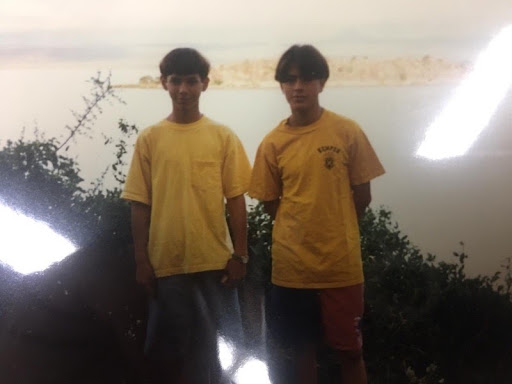
The Wrights also aim to close a loophole that allows buyers in private transactions to purchase weapons without going through background checks. “It’s incredible, that this guy that took 49 lives at Pulse was given all this weaponry and he got it legally,” said Mr. Wright.
They also want to put an end to gun sales to individuals who are on the nation’s “No-Fly” terrorist watch list. Legislation they support would prohibit known or suspected terrorists from purchasing firearms. The list is overseen by the Federal Bureau of Investigation and the Department of Justice.
Through the first five months of 2021, there were more than 8,100 gun violence-related deaths reported in the United States. That is an average of 54 lives per day according to data collected from the Gun Violence Archive, a nonprofit research organization.
The U.S. is divided when it comes to gun control. About 49% say there would be fewer mass shootings if stricter gun laws were enacted, while 42% of individuals believe it would make no difference. A remainder of 9% said that there would be more mass shootings according to the poll.
FIU study showing LGBTQ hate crimes in Miami Dade
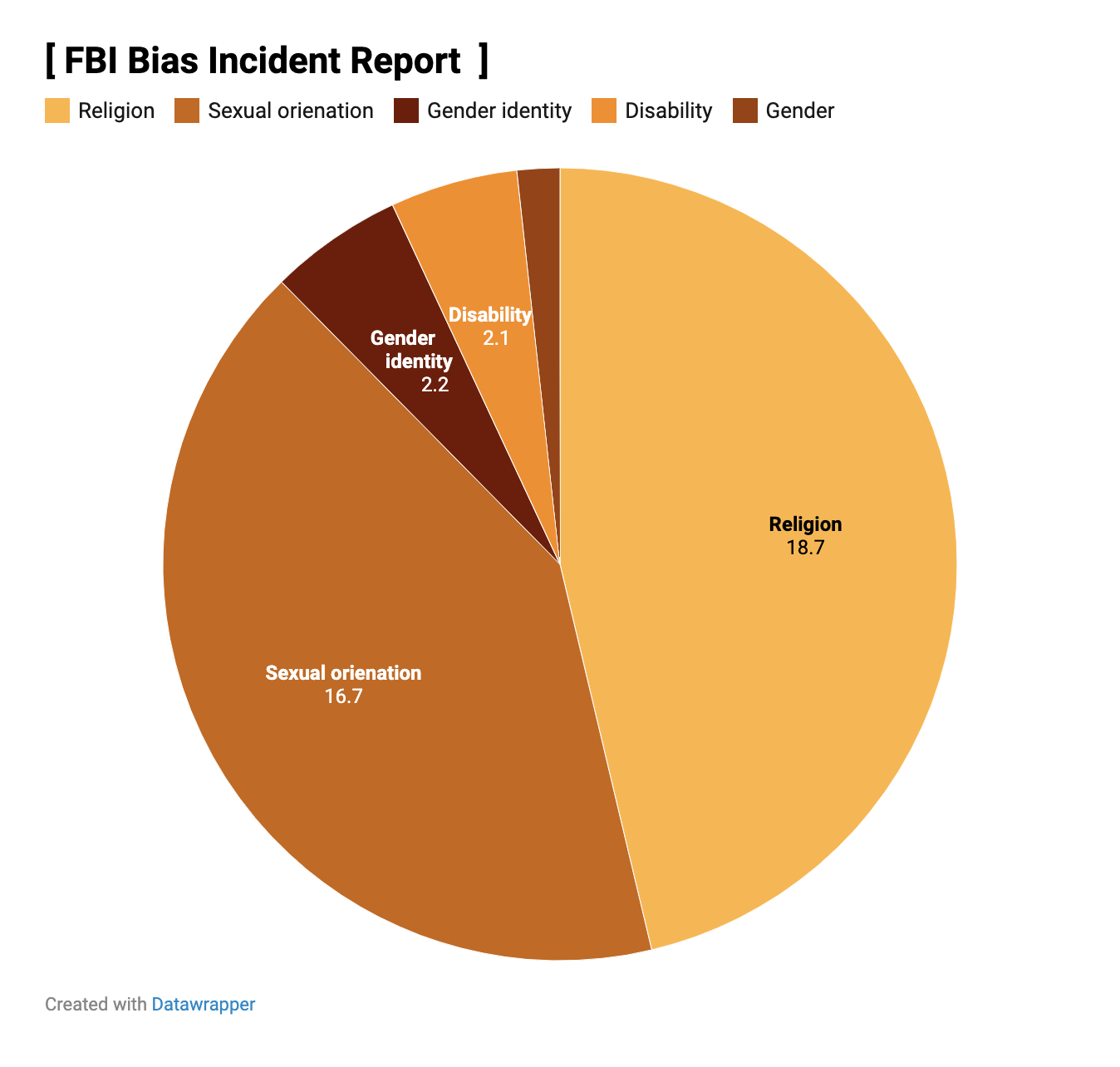
Data showing five categories labeled as bias incident hate crimes. The data is compiled by the FBI Uniform Crime Reporting (UCR) gathering a total of 8,646 victims
A study launched in 2018 by Florida International University associate professor of criminology and criminal justice Besiki Luka Kutateladze, in dedication of the mass shooting at Pulse, showed an estimated 3,859 violent and property offenses are committed against individuals who identified themselves as LGBTQ members in Miami annually.
“Particularly when it comes to minority groups, we see a lack of effective identification, investigation, and prosecution of LGBTQ-related hate crimes in Miami,” said Kutateladze.
Most of the LGBTQ-related hate crimes in Miami-Dade County typically go unreported, said Kutateladze. According to the report, anti-LGBTQ hate crimes are less likely to be reported by the police, than those motivated by racism or Islamophobia and Anti-semitism.
The reason?
Many of the victims limit themselves from reporting hate crimes related to their sexuality because they feel discriminated against, or “outed” by police officials.
In Miami-Dade county alone, 85% of incidents were not reported. The data does not account for gun-related crimes directed towards the LGBTQ community.
Five years since the tragedy, Maria and Fred Wright continue to keep Jerry’s memory alive by advocating for stronger gun control.
“We’ve been doing this for five years,” said Mrs. Wright. “I can almost hear Jerry say, ‘You guys need to take a break.”

































